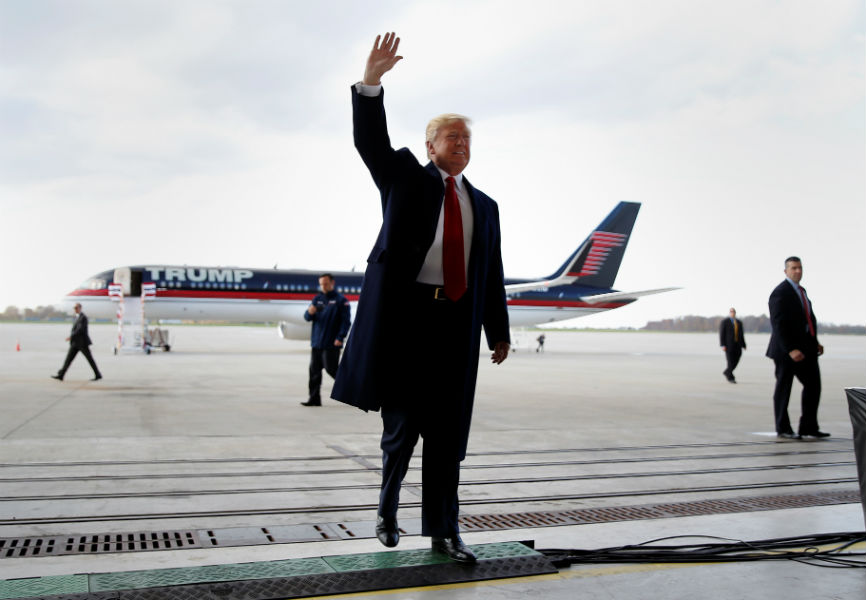


Australian politics have for decades been defined in reaction to the irregular migrants who periodically try to make their way to Australia by sea. Both liberal and conservative governments have blocked those arrivals, leaving thousands of intercepted people in long-term detention centers outside the Australian mainland. This is a political culture that would feel very familiar to American immigration hawks. But like two magnets with identical polarity, Trump and Turnbull's shared politics pushed each other apart. Trump's position on refugees seems to be highly informed by Bannon, who has questioned not just illegal but legal immigration to the U.S. In the Turnbull call, we're seeing how rigid that position is, even when it runs into long-term allies' interests. For Australia, this represents a new incentivize to hedge with closer relations with China. For the U.S., analysts need to reassess to how a new ideology will play out in unfamiliar domains.
The other element of the Trump doctrine that's coming into view now — yes, all presidents must have a doctrine — is on counterterror. In Yemen, the administration executed a raid that the Obama administration did not put into action, resulting in intelligence but also casualties. It then apparently doubled down by shelling al-Qaeda positions from warships. In Syria, the Trump administration threw out Obama's long-debated by unexecuted plan for helping Kurdish fighters advance on Raqqa, in part because it didn't have any provisions for coordinating attacks with Russia. The Trump administration is resisting the idea that it's risk-averse, so put it this way. If you were one of the many critics who thought Obama's policy in the Middle East involved too much deliberation and too little action, get ready: your view is about to get tested by reality.
Self-Promotion Interlude: Watch Eurasia Group's Latin America team review the Trump effect from Mexico City.
Ranked: Leaders Who Are Out of Office, But Not Out of Power
Less than two weeks into the Trump presidency, Barack Obama took a break from vacationing to object to Trump's executive order on immigration. We seem to be headed for a much more conflictual relationship between past and present presidents than the U.S. is used to. But, barred from seeking the presidency again, Obama poses only a limited threat to Trump, who will be much more worried about disunity within his own party. In other parts of the world, however, former leaders carry much more sway. Here are several ex-leaders who have managed to exercise power over their state's current leadership.
5. Alvaro Uribe. Colombian politics have been shaped by a rift between two former allies turned rivals: current President Juan Manuel Santos and Uribe, Santos' immediate predecessor as president. The two disagree sharply about how to manage Colombia's long-running conflict with the FARC and other violent groups, with Uribe strongly opposed to the reconciliation embodied in the peace deal Santos negotiated with the FARC. Colombia's decision to reject the peace plan in a referendum last year — Santos went on to conclude a modified deal — boosted Uribe politically. He is personally barred from seeking office again by term limits, but he holds a seat in the Senate and has launched a new party that will challenge Santos' allies in elections in 2018.
4. Mahathir Mohamad. At 91, and with more than two decades as prime minister under his belt, one could forgive Malaysia's former leader for enjoying a quiet retirement. Instead, last year, he quit the party he led for decades to launch a campaign against the current prime minister, Najib Razak. Mahathir's complaint centers on a corruption scandal involving 1MDB, a sovereign wealth fund, and the allegations that Najib has inappropriately enriched himself. Najib's alliance-building and careful control of the levers of democracy — voting districts are reportedly heavily gerrymandered — are likely to keep him in power in upcoming elections. But in Mahathir he has found a tough adversary.
3. Matteo Renzi. Italians cannot swing a dead cat without hitting a former prime minister. The latest laureate of the illustrious award, “most recent former prime minister of Italy,” is Renzi, who stepped down last year after losing a referendum on Italy's election laws. But while he may no longer be the country's official leader — he has handed over the government to fellow party-member Paolo Gentiloni — he retains control of his party and is hoping to lead it back to victory. That path requires navigating between yet another former prime minister, Silvio Berlusconi, who is reportedly scheming a return to power, and the anti-establishment Five Star Movement, who would prefer to throw all the bums out. One way or the other, Renzi may not keep his most-recent-former laurels for long.
2. Nouri al-Maliki. If you can't be king, why not kingmaker? The former strongman prime minister of Iraq was forced to relinquish the top job in 2014 in favor of a less sectarian candidate, Haider al-Abadi. But much of Iraq's political power still runs through Maliki, who has the post of vice president, despite efforts by Abadi to strip him of the title. He also carries significant sway over the Shiite militias known as the Popular Mobilization Units, which have played a controversial role in the effort to recapture Mosul from ISIS. He has refused to rule out a formal attempt to return as prime minister, but even if he stays behind the scenes, he will continue to wield significant sway over Iraq.
1. Luiz Inácio Lula da Silva. Lula, as Brazil's former president is known, deserves an award for the most ignominious collapse of a political legacy. After leading Brazil through eight years of growing prosperity and international prestige, Lula handed the reins of power to his favored successor, Dilma Rousseff, only to see her impeached in the wake of a corruption scandal that is still shaking Brazil's government. Despite facing multiple graft charges himself, Lula seems undaunted, declaring last year, “Only Jesus Christ beats me here in Brazil.” We might get to find out who's tougher. After taking a break from the presidency, Lula is eligible to run again in 2018.
Your Weekly Bremmer: This week, a personal note from Ian.
“A Girl from Aleppo”
One day in 1923, Maria Orfaly fled her home. Maria was the daughter of Simon Orfaly (originally Simon Ourfalian), a merchant from Aleppo. Simon also had three sons — and two other children who died shortly after birth. Maria and her brothers grew up in Ottoman Syria as Armenians, branding them as outcasts from the day they were born. It was genocide that forced them onto the road, and she fled persecution for Ellis Island, just four miles from what is now Eurasia Group's global headquarters. I'm proud to tell you that Maria was my grandmother.
A glance was enough to see that Maria was a tough old lady. Fiercely intelligent and outspoken, she waved off offers of help she felt she didn't need. She inspired my love for politics at an early age by organizing a 'silver haired senate,' an organization of senior citizens in Boston brought together to promote legislation in line with their interests.
I come from immigrants. From refugees. People from everywhere, of every description, and from every tradition have worked hard to make America greater tomorrow than it is today. They bring skills, plans, drive, and endurance. These are my people. These are American people. May it ever be so.
– Ian Bremmer
Hard Numbers
57 percent of Afghanistan is under the uncontested control of the central government. That's down from 72 percent just one year ago.
2 years passed between Taiwanese President Tsai Ing-wen's first English tweet, posted during her recent stopover in the U.S., and her previous use of the social media service. Like everyone else, she clearly gets that the easiest way to President Trump's heart is through his Twitter feed.
10,330 explosions were recorded in the Donetsk region of eastern Ukraine during a recent trip by international monitors, the highest they've ever registered.
81 parties have registered for the Netherlands' March primaries. One even pledges to refuse to vote in parliament if elected.
270 Turks are being put on trial in the country's largest hearing since the failed coup last July. The good news for the defendants? A shiny new courthouse.
“To be a progressive, you need to know how to produce before redistributing.”
– French presidential candidate Emmanuel Macron, challenging the country's left-wing orthodoxy. He's starting to steal the show as Francois Fillon stumbles.
Signal is written by Matt Peterson (@mattbpete) with editorial support from Gabe Lipton (@gflipton). Don't like what you read? Feel free to yell at us on Twitter or just reply to this email.